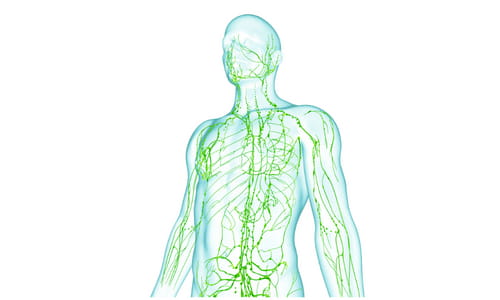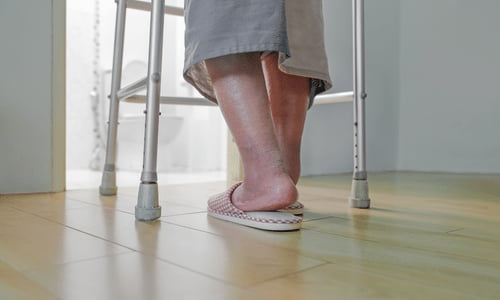Quick Guide to the Lymphedema Diet
“Quick Guide to the Lymphedema Diet” was written by Daria Zajac, RDN, edited by Avery Karp, & final review/edit completed by Aly Bouzek, MS, RDN. Avery is a dietetic student at Kennesaw State University.
Lymphedema
Have you or your loved one been recently diagnosed with lymphedema? If so, keep reading to learn more about lymphedema and the lymphedema diet. With so many different diets that circulate in the media nowadays, it can certainly be difficult to keep track of them all.
It can be especially challenging when you are making important health decisions for yourself and don’t know where to look for help!
Look no further because in this article, we break down the basics of lymphedema but most importantly, how you can implement a lymphedema diet in your life.
Lymphatic System and Lymphedema

You may be asking yourself, “What even is lymphedema?”
Well, let’s dig in.
It all begins with our lymphatic system.
The lymphatic system is a network of vessels and tissues that works to maintain fluid balance in our bodies. (1)
It’s an important part of our immune system too, working to keep us healthy around the clock!
Lymphedema is a condition that develops after an injury or trauma occurs and consequently damages or blocks the lymphatic system. The most common examples of injury to the lymphatic system include cancer and radiation treatments. (1)
To put it simply, lymphedema is a collection of fluid that occurs most commonly in the arms and legs (although it can occur in other areas) due to impaired lymph circulation. (2)
How Does Lymphedema Develop?
Lymph, a fluid that contains proteins, salt, water, and white blood cells. It gets transported throughout the lymphatic system to collect and get rid of waste.
Lymph eventually merges with blood to prevent fluid accumulation in any one area within a healthy body.
When there is damage or injury to the lymphatic vessels, fluid is not filtered correctly and builds up. Excess fluid creates pressure on the body’s tissues and organs, starts an inflammatory reaction, and lymphedema (also known as lymph overload) occurs.
Some risk factors that can contribute to the development of lymphedema are (2,3):
- old age
- cancer
- obesity
- rheumatoid arthritis
Lymphedema Symptoms & Lymphedema Diet Changes

Symptoms of lymphedema in the older adult include (2):
- swelling in the upper/lower extremities
- skin tightness
- a burning/itching sensation
Many of these symptoms can be relieved through small diet changes discussed below.
If you start to notice any of these symptoms, consult with your doctor, as they can perform a physical exam to determine the severity of lymphedema and create an appropriate treatment plan.
The Older Adult with Lymphedema
Most studies on lymphedema have been conducted on female breast cancer patients. (4) Why?
As noted earlier, cancer is a condition that damages the lymphatic system. Breast tissue and the axillary lymphatic system (underarms) are so close in proximity that the lymph nodes in the underarm area are almost always affected in patients with breast cancer. (5)
But don’t let this fool you, lymphedema can occur in both males and females. According to the Lymphatic Education & Research Network, about 10 million Americans have lymphedema and lymphatic diseases. (6)
Having cancer and being older in age puts you or your loved ones at increased risk for developing lymphedema.
What is the Lymphedema Diet?

So, you have a lymphedema diagnosis – now what?
Have no fear because the lymphedema diet is here! Alright, well, sort of.
Here’s the catch: There is NO official lymphedema diet.
No specific meal plan for lymphedema exists.
However, a general healthful diet that includes a diverse selection of antioxidant-rich fruits and vegetables, whole grains, protein, and adequate water intake can improve your symptoms.
Since there is no specific lymphedema diet, keep reading to find the 5 best tips to alleviate your lymphedema symptoms!
#1: Avoid High Sodium Foods
Sodium and water have an interesting, codependent relationship. With high salt intake from processed foods, fast food or added table salt, the body reacts by retaining (or holding on to) water to help flush out the salt.
Since fluid removal doesn’t work properly with lymphedema, monitoring salt intake can help reduce excess water collection in your body.
Tip: Instead of added salt at the table, try using seasonings such as onion powder, lemon zest, or dill.
#2: Limit Refined Sugars
The 2020-2025 Dietary Guidelines for Americans recommends limiting added sugars to 10% of total daily calories. And yet, about 60% of older adults exceed this recommendation. (7)
Foods that contain high amounts of refined sugar include baked goods such as breads, pastries, and other sweet treats. It’s hard to believe, but even some sauces and condiments have hidden sugars in them as well.
Make sure to check food labels when purchasing these types of products.
Of course, balance in life is key, but it is important to note that chronic conditions such as diabetes, hypertension, and obesity can develop if sugar intake is not controlled which may worsen lymphedema symptoms.
Tip: If you are craving something sweet to eat, pair your snack with a protein source to keep you satiated (ex: peanut butter with a banana, or chocolate with nuts).
#3: Eat Your Protein

When it comes to protein intake, many older Americans fall short (50% of women and 30% of men that are 71 years and older). (7)
Protein is a vital macronutrient to focus on in the “lymphedema diet.”
Proteins are considered the building blocks of the body because they are involved in important processes that build and repair our muscles.
When we don’t get enough protein through our diet, our body breaks down existing proteins which can decrease our muscle mass, increase inflammation, and worsen lymphedema.
Tip: Animal meats, dairy products, nuts, seeds, and legumes contain protein. Include a protein source at each meal and snack to boost your overall daily protein intake.
#4: Stay Hydrated
Although it may seem contradictory to drink water when your body is in excess, maintaining proper hydration is important.
When you are dehydrated, your body actually preserves (holds on to) water that’s already there, thus making it harder to ease symptoms of lymphedema.
Tip: Take small, but frequent sips of water. If you need reminders, try setting a timer on your cell phone throughout the day to increase fluid intake. Slow and steady wins the race!
#5: Maintain a Healthy Body Weight
Older adults often find it difficult to maintain their usual body weight due to a variety of things including:
- loss of appetite
- loss of teeth/ damaged dentures
- medications
Weight loss is a natural process of aging; however, this should not decrease the importance of consuming enough food and drink.
A balanced diet that focuses on fruits and vegetables, whole grains, healthy fats, and the occasional sweet treat is all a part of achieving a healthy weight and getting all your nutrients in!
Tip: If you can’t eat a whole meal in one sitting, try eating 5-6 smaller meals and 1-2 snacks spread throughout the day.
Lymphedema Diet vs Dash Diet: Is There a Difference?
The DASH diet stands for Dietary Approaches to Stop Hypertension.
While there is no official lymphedema diet, many principles of the DASH diet can apply to those with lymphedema.
Increased fruit, vegetable, and whole grain consumption as well as limited refined sugars and salt intake are included in the DASH diet recommendations. (8)
These guidelines are linked to preventing chronic diseases such as hypertension and diabetes, (conditions that can exacerbate lymphedema symptoms).
Following these guidelines may not only ease your lymphedema symptoms, but can help you maintain a healthy lifestyle as well.
Lymphedema Diet & Exercise
Exercise, even something as simple as walking, improves lymph flow through the body. (2)
But the best type of exercise to focus on is the exercise that you enjoy! According to the Center for Disease Control and Prevention (CDC), at least 150 minutes of physical activity per week is recommended for older adults aged 65 and older. (9)
Always consult with your doctor before making any changes to your exercise routine to ensure safety.
Tip: Making small changes to your diet and exercise routine can help promote consistency. You’re more likely to stick to diet and exercise changes if you start small and listen to your body (and your doctor!). Monitor your progress weekly and adjust as needed.
Life with Lymphedema
Receiving a lymphedema diagnosis can be overwhelming and confusing, but factors that affect severity of lymphedema, like diet and lifestyle, are things that you can have control over.
This article pinpoints science-based recommendations to improve symptoms and your overall health. Download your FREE Quick Guide to the Lymphedema Diet in Older Adults infographic today.
5 Lymphedema Diet Tips Infographic

References
- What is Lymphedema? American Cancer Society. Updated May 25, 2021. Accessed October 2022. https://www.cancer.org/treatment/treatments-and-side-effects/physical-side-effects/lymphedema/what-is-lymphedema.html.
- Lymphedema. Cleveland Clinic. Updated September 16, 2022. Accessed October 2022. https://my.clevelandclinic.org/health/diseases/8353-lymphedema.
- Lymphedema. Mayo Clinic. Accessed October 2022. https://www.mayoclinic.org/diseases-conditions/lymphedema/symptoms-causes/syc-20374682#:~:text=Factors%20that%20may%20increase%20the,Rheumatoid%20or%20psoriatic%20arthritis.
- Sleigh BC, Manna B. Updated September 18, 2022. Lymphedema. StatPearls Publishing; 2022. https://www.ncbi.nlm.nih.gov/books/NBK537239/#:~:text=Primary%20lymphedema%20is%20rare%2C%20affecting,approximately%201%20in%201000%20Americans.
- Manahan M. Breast Cancer: Lymphedema After Treatment. Johns Hopkins Medicine. Accessed October 2022. https://www.hopkinsmedicine.org/health/conditions-and-diseases/breast-cancer/breast-cancer-lymphedema-after-treatment#:~:text=During%20surgery%20for%20cancer%2C%20nearby,This%20is%20lymphedema.
- Lymphedema and Lymphatic Diseases Affect Millions and Concern us All. Lymphatic Education & Research Network. Accessed October 24, 2022. https://lymphaticnetwork.org/living-with-lymphedema/lymphedema-and-lymphatic-diseases-affect-millions-and-concern-us-all.
- Dietary Guidelines for Americans: 2020-2025. USDA. Published December 2020. Accessed October 2022. https://www.dietaryguidelines.gov/sites/default/files/2020-12/Dietary_Guidelines_for_Americans_2020-2025.pdf
- DASH Eating Plan. National Heart, Lung, and Blood Institute. Updated December 29, 2021. Accessed October 2022. https://www.nhlbi.nih.gov/education/dash-eating-plan.
- Older Adults. Center for Disease Control and Prevention. Updated June 3, 2022. Accessed October 2022. https://www.cdc.gov/physicalactivity/basics/older_adults/index.htm.

Finally I found material that I can understand and follow and that actually makes sense to me. Thank you so much
This is good information for those that are looking to improve their diets with this health condition in mind. Avoiding sodium in high volumes is a no-brainer.